
Dogs are, without a doubt, the best and most loyal friends any person could have. Our dogs are always ready to accompany us in all our adventures and misadventures. Dogs are caring, love, loyal and more. However, there are some things humans do that dogs hate. This is either because it causes them discomfort or because they don’t quite understand our way of doing things, naturally. If everyone dedicates themselves to better understand the language and communication of dogs, there will be a greater general understanding of what not to do to dogs. In fact, in order to care for a dog correctly, one needs to know what not to do to their dogs.
Do you want to know how to care for your dog properly, if so, you’ve come to the right place! In order to perfect dog care, you need to know how not to treat your dogs. That’s why here at AnimalWised we have collected 15 things you should not do to your dog.
1. Dog care - Animal welfare
Like us, dogs require certain basic freedoms and rights in order to enjoy a healthy, dignified and happy life. Therefore, if you have a dog, we suggest knowing and respecting the 5 freedoms of animal welfare. These five freedoms function as the pillars on which you can build a positive relationship with your pup; based on trust and mutual affection. Therefore, ignoring their basic needs and rights is definitely one of the things you should not do with your dogs.
The 5 freedoms of animal welfare include:
- Freedom from thirst, hunger and malnutrition.
- Freedom of discomfort.
- Freedom from pain and illness.
- Freedom to express themselves naturally.
- Freedom of fear and stress.
If you want to know more about these, please take a look at our article on: The Five Freedoms Of Animal Welfare.
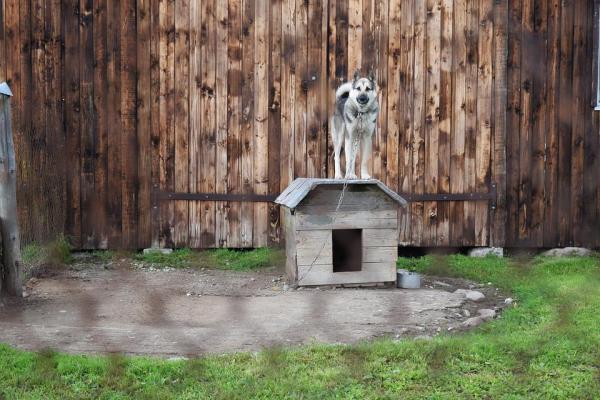
2. Dog care - Understanding dog behavior
Yes, your dog will jump on you when you return home and your clothes will get dirty. Yes, your house, your chairs and even your face will get covered in dog drool. Yes, you will have to give your dog attention to avoid a destructive canine. Yes, your dog will smell different and finally; yes, your dog will smell the butts of other dogs.
In short, your dog is a dog; your dog is not a human and not a baby. Dog’s have a set nature which needs to be respected by their guardians. Do not get angry with your dog when they act instinctively. Anger is an emotion that dogs can sense. If you scold your dog they could develop forms of stress and anxiety; and this negative training could result in a badly behaved dog. We always recommend using positive reinforcement to teach and train your dog accordingly. If, at times, your dog frustrated, remove yourself from the situation and take time. But, whatever you do, do not; scold, reprimand or punish your dog for being a dog! For more, take a look at; 5 Mistakes You Make When Scolding A Dog.

3. Stop treating your dog like a human
As we mentioned in the previous section, your dog is a dog, not a person, let alone a baby. This does not mean that one of the two are superior or inferior. It means that each has its own organism, its own personality and, consequently, its own needs. Although it may seem that a humanized dog receives many "luxuries and royalties", the truth is that dogs which are treated like humans suffer; as they cannot express themselves freely.
As dog guardians, it is our most beautiful mission and responsibility to learn to respect and love our dogs for their individual way of being; including all of their similarities as well as differences. Of course we are not saying to not give your dog affection, we’re simply saying that humanizing a dog can in fact stop them from living freely.
Do you treat your dog like a human? If so, we consider reading our article on why you shouldn’t treat your dog like a human.

4. Dog care- Proper dog education
When adopting a dog, you must be aware that, besides providing your dog with love, fun and affection, you will also need to educate it. Sadly, very often we see dogs that are abandoned by their families for presenting behavioral problems. These problems, however, are almost always associated with bad education and poor socialization.
Educating your dog correctly will allow your dog to learn your house’s rules, and will allow for the promotion of a safe and healthy space and relationship between dog and humans. But that's not all: training is, in short, the best exercise you can offer your dog. Training dogs can stimulate them on a physical, cognitive, emotional and social level.
For some ideas on how to train your dog correctly, take a look at our following article:
- How To Train Your Dog
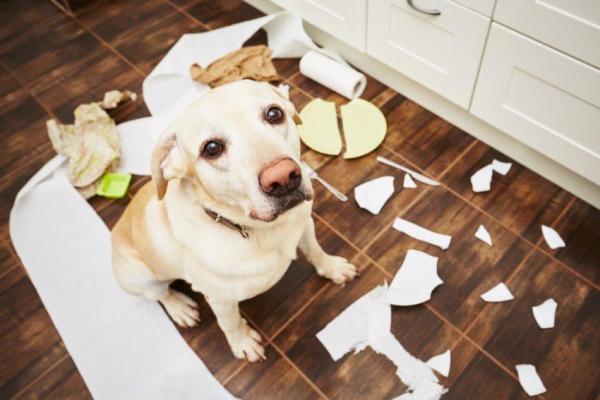
5. Dog care - Positive punishment
Erroneously, humanity has believed for many years that physical or emotional dog punishment was educational. But fortunately, today, we have learnt that any form of punishment, be that physical or emotional, is completely counterproductive.
If you want to educate a dog, you must never resort to physical force or psychological humiliation. Under no circumstance should you; beat your dog, punish it, lock it up, yell at it, offend it or scold it. All of these "techniques" (which are not educational) expose your dog to negative emotions, such as fear and stress. A dog that is afraid, scared and who does not trust its owner; will have enormous difficulties in concentrating and learning. Not only this, but it could also force your dog to be defensive, and react by attacking; specifically when it feels threatened.
Therefore, punishments of any nature are dangerous and totally counterproductive when education your dog. To teach a dog, opt for positive reinforcement. Positive reinforcement helps dogs stimulate their physical, cognitive and emotional abilities.
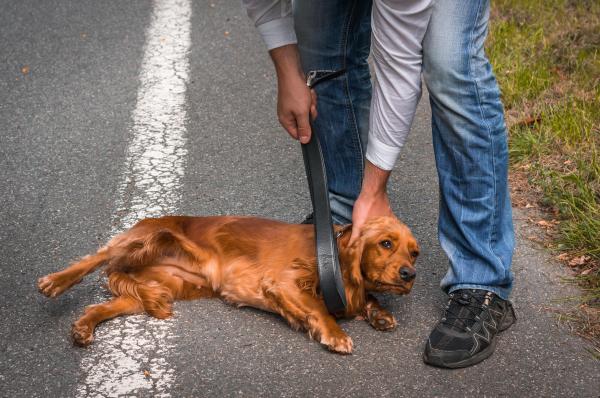
6. Dog care - Negligence
The abandonment of dogs and other pets is a sad reality that is extremely prevalent in our day to day lives. In the vast majority of cases, animal abandonment can be avoided if we all create enough awareness when adopting a pet.
A dog is an intelligent and sensitive animal that requires time and space to develop correctly. This is in addition, to feeding it, taking it to the veterinarian, vaccinating it, deworming it. You also have to provide an animal with other essential care including; oral hygiene, toys to stimulate both it physically and mentally, objects to walk and provide welfare (leash, muzzle, etc.), it will also be necessary to have certain economic solvency. All of this emphasizes why one needs to plan efficiently, prior to adopting a dog or adopting a cat. When adopting an animal you need to act responsibily and make sure you can care for this animal for a long amount of time.
But there is another form of abandonment, which is just as cruel as the previous one; animal neglect. If you do not pay attention to the needs of your dog, if you are always too busy to share time with your animal, if you lock up your animal or deprive your animal of freedom to explore and be itself; then you are doing something VERY wrong. All of this is just as bad as direct abandonment. And again, this is why here at AnimalWised we encourage responsible adoption and animal care.
We advocate making sure that you rake your dog for daily walks, offer your dog adequate affection and feed it accordingly to it’s breed, age and size.
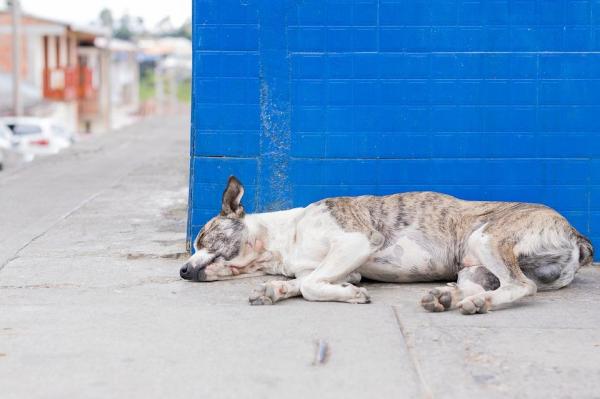
7. Dog care - Responsible play
There are many interesting and strange things that dogs do that can make us laugh and can be a form of humor for us humans. However, you should never force your dog into a stressful or uncomfortable situation for the sake of a laugh. For example, some dogs don’t like hugs. We may also wonder, do dogs like kisses? The thing is, it depends. All dogs are different and you need to treat them as individuals. Find out the difference between what your dog likes and what actually makes your dog stressed.
Sure, dogs like to have fun. But choose activities that ensure your dog always feels safe. For example, holding a puppy outside of a window while driving is not funny! In fact, such things can cause your puppy to be stressed and it can result in a fearful dog.
In addition, especially if you adopt an adult dog, make sure that you address any fears it may have from past experiences. For more, find out; Why Your Dog Is Scared Of Everything.
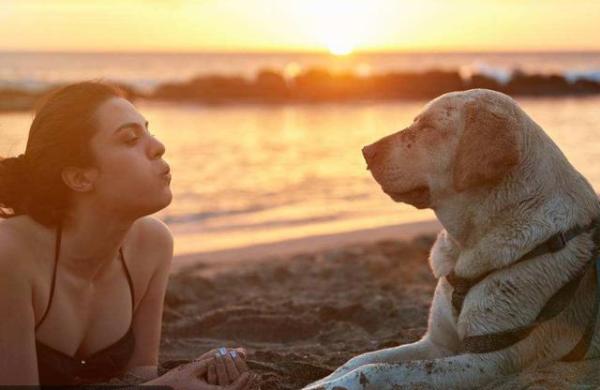
8. Dog care - Your dog’s health
Logically, if you notice changes in the behavior or appearance of your dog, you wouldn’t hesitate to take your dog to a veterinarian near you immediately. However, it is also essential to take your dog to a veterinarian every six month, allowing a professional to control and verify your dog’s state of health. Taking a dog to a vet every six months also functions as a preventative measure. Make sure you respect and follow your dog’s periodic vaccination and deworming schedule strictly.
All dogs, whether mixed or pure bred, deserve to receive adequate preventative medicine, protecting them against common dog diseases and behavioral problems in dogs. Remember that; a balanced diet, the proper physical and mental stimulation of your dog, oral hygiene and a safe environment are essential to preserve the good health of your best friend.

9. Dog care - Extended punishment
When you scold your dog, as already mentioned, you place him/her into a high stress context. This environment can negatively impact your dogs physiology or psychology. Therefore, when scolded, many dogs lose control over their own reactions and may express this through involuntary acts, such as uncontrolled urination.
If you have adopted a dog recently, you should be especially attentive to these such behaviors, as they can be a sign that the dog has not been properly socialized or has suffered physical and emotional abuse.
Also, if you scold your dog for something that happened a couple of hours or days ago, it will not understand the reason for your anger and thereby generate a lot of mistrust.
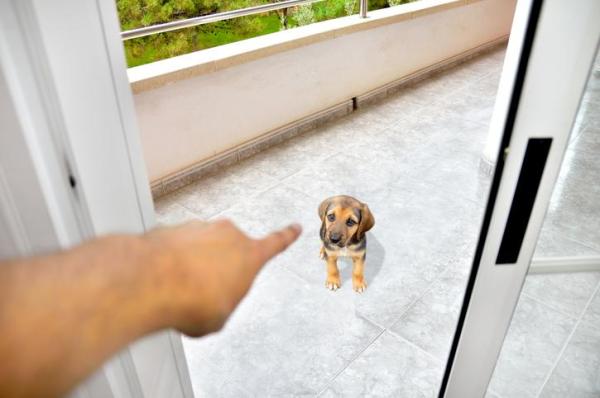
10. Dog care -Toxic food for dogs
Providing your dog with a complete and balanced diet means not only to taking care of its health, but also respecting its needs. In addition, there are many forbidden foods for dogs which we as humans consume regularly. Some of these foods include; chocolate, sugar, salt, and even certain fruits and vegetables that can be toxic for dogs. In addition, a canine’s body is not prepared to assimilate specific foods like a humans. Foods dogs struggle to digest include; fried foods, industrialized foods or artificial candies (candy, chewing gums, etc.).
You can offer your dog a a homemade and nutritious dog diet. But if you choose to opt for commercial feed for your dog, always choose the high quality products; which contain proteins of animal origin that are also highly digestible.
To help you choose the best diet for your dog, take a look at the following articles;
- Homemade Food For Dogs
- Forbidden Foods For Dogs
- Dog Food Allergies And Intolerance

11. Dog care - Dog socialization
Dogs are highly sociable animals that enjoy any opportunity to; interact with other dogs, express their curiosity, discover new stimuli and exercise their senses at the same time. For this reason, for most dogs, walks are one of the happiest moments of their day.
If you deprive your best friend of interacting with other dogs, with other people and even animals of other species; you stunt its ability to develop their cognitive, emotional and social skills. In addition, it is very important that your dog learns to relate positively with; other individuals, environmental stimuli and with their own territory. This will prevent your dog from becoming aggressive or fearful of social interactions.
Dog socialization is a key part of a dog’s education, since it gives them the possibility to live and interact with other individuals with both security and self-confidence.
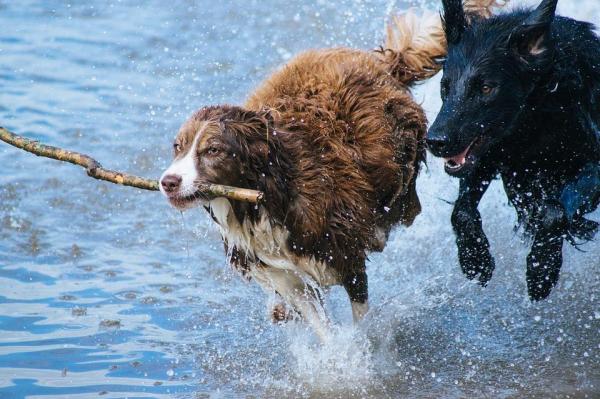
12. Dog care - dog behavior problems
All dogs, regardless of race, sex or age, can develop certain behavior problems throughout their lives. If you educate and socialize your dog correctly from when they are a puppy, giving them the appropriate care and proper preventive medicine; you can prevent an infinity of unwanted behaviors. However, you should never abandon, neglect or give up your dog if he/she is experiencing behavioral problems at a specific time in their lives.
A behavior problem in a dog is not a permanent sentence, much less does it indicate a flaw in their character. It is simply a sign that something is not right in your dog’s body or mind. Therefore, by being able to identifying that the character of your dog has changed, the first thing you should do is take it to a veterinarian.
A veterinarian will be able to verify your dog’s health status and identify why your dog is acting differently. Many diseases that cause intense pain or interfere in a dog’s senses, as well as hormonal disturbances, can generate behavioral problems in dogs. When diagnosing any canine pathology, a professional may recommend the appropriate treatment. But if any pathological cause is ruled out, it would be best to consult an ethologist or canine educator. For more, take a look at: Why Has My Dog’s Personality Changed?

If you want to read similar articles to What NOT To Do To Your Dog, we recommend you visit our Extra care category.